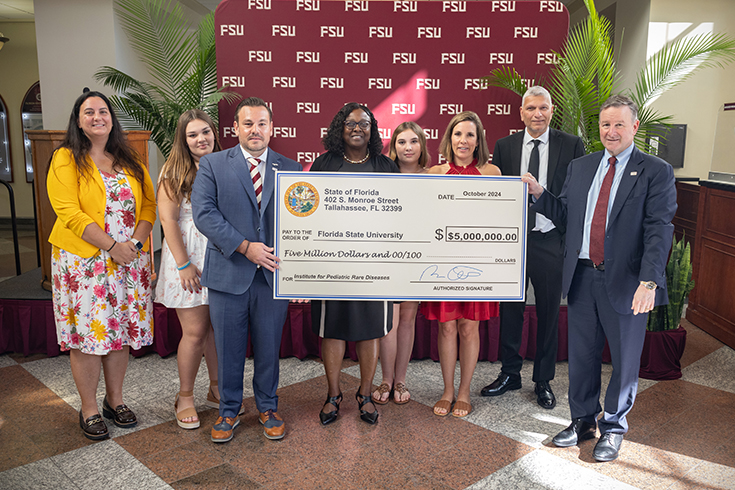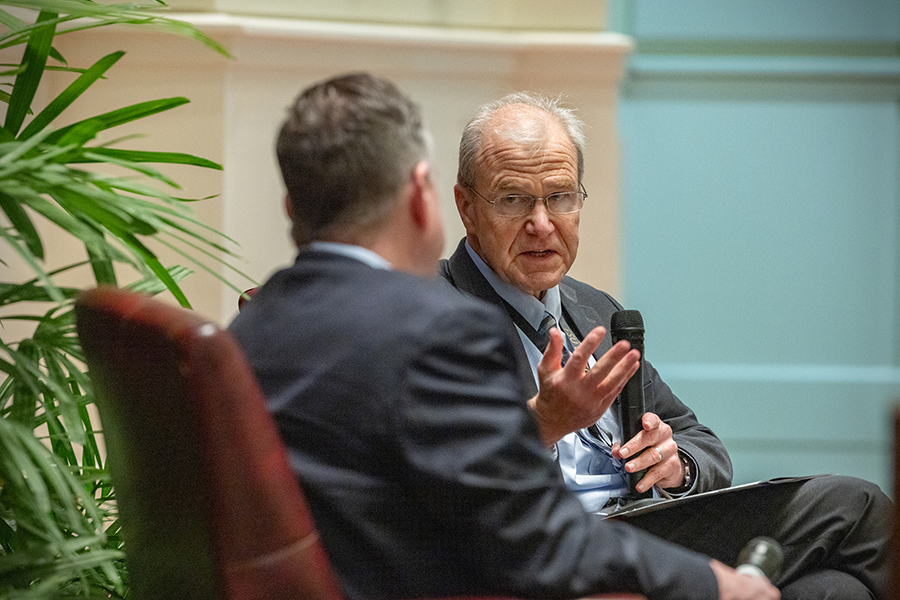
As the launching point for FSU Discovery Days, Monday’s Pediatric Rare Disease Symposium was fueled by Rep. Adam Anderson’s presentation of a $5 million check from the State of Florida for additional support of the college’s Institute for Pediatric Rare Diseases (IPRD).
The ceremonial presentation of new funding at the Florida State University College of Medicine served as a backdrop for a gathering of some of the nation’s foremost authorities on rare disease research and discovery inside the college’s Durell Peaden Auditorium.
The 2019 death of Anderson’s son, 4-year-old Andrew, from Tay-Sachs disease ignited his advocacy for advances in research. Just 18 months after his initial meeting with FSU President Richard McCullough, who agreed to support IPRD’s development, Anderson was shaking his head in astonishment at the gathering of rare disease game-changers.
“This has moved lightning-fast,” Anderson said. “We have this group of industry leaders and brilliant researchers from all over the country here. That’s a big deal. There’s nothing like this in the entire country.”
Whole genome sequencing, gene therapy and molecular medicine were among the topics of presenters from the National Institutes of Health, Stanford University, Harvard University, Nicklaus Children’s Health System, the University of Miami and the University of Florida.
“These experts provide us with valuable insight into the state of rare disease programs and the critical role of collaboration between researchers, clinicians and the families that they serve,” said IPRD Director Pradeep Bhide, who coordinated the event, assisted by FSU Vice President for Research Stacey Patterson.
The day-long event included a lunchtime meeting of Florida’s Rare Disease Advisory Council and concluded with a roundtable discussion featuring industry leaders.
It began, however, with McCullough introducing the keynote speaker, Dr. Terence R. Flotte, M.D., who he described as a pioneer in gene therapy and rare disease research.
“His work has literally changed the landscape of genetic medicine, particularly for rare and life-threatening conditions,” McCullough said.

Flotte, executive deputy chancellor and provost of the UMass Chan Medical School, has more than 30 years of expertise developing gene therapies for genetic diseases like Tay-Sachs.
He was impressed and encouraged by FSU’s commitment, both to IPRD and the gathering of experts driven to find answers to roughly 7,000 recognized rare diseases in the world that impact 350 million people globally and 30 million in the United States.
“It is a very, very fitting way to focus one’s resources,” Flotte said of the IPRD. “I can think of no other higher mission than to harness all of the tools that we’ve been given through discovery, to make a difference for children and families who have no other hope.”
Flotte spoke at length on his specialty, working with the adeno-associated virus (AAV) as a delivery system to combat neurological diseases such as Tay-Sachs, and noted the progress being made in clinical trials. As of January 2024, there were 31 gene therapies approved globally for clinical use, including genetically modified cell therapies. An additional 30 RNA therapies, which target both infectious diseases and genetic diseases, are also approved.
In his post-keynote discussion with McCullough in front of an audience of about 150 people, Flotte shared a story about a Ukrainian infant living in Belgium, who arrived in his care via medical visa, who is showing signs of improvement following AAV therapy.
The patient’s family is “feeling a sense of hope at this point,” Flotte said. “While that has been very touching, I can’t help but have this shadow of concern. We don’t necessarily think we’ve hit the home run here. We have maybe made the baby better, but that’s far from the cure and that really weighs on us.”
And it’s the cure that continues to drive the research, which is where IPRD comes into play.
“We are creating a hub where researchers, clinicians, and families can work together to find answers for conditions that too often go unrecognized and untreated,” said College of Medicine Dean Dr. Alma Littles, M.D. “Our mission is simple yet powerful: to bring hope to children and families by driving discoveries that can lead to new therapies and interventions for rare diseases.”
“We’re laser focused on trying to save the lives of children facing rare diseases,” McCullough said. “Through research, education, clinical care and advocacy, we aim to make a real difference.”
Progress on treatments is underway.
“I know that it’s just a matter of time before we’re celebrating a child whose life was saved by the good work that’s being done here at FSU,” Anderson said.
For a full schedule of FSU Discovery Days events, click here.




